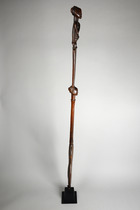Staff of office "kibango" · D. R. Congo, Luba · ID: 3046607
By descent through the family
Artcurial, Paris, 4 December 2004, Lot 101
Pierre Dartevelle, Brussels, Belgium (2005)
Olivier Castellano, Paris, France (2008)
Description
wood, colour pigments, base
“Kibango” are among the regalia said to have been introduced by Mbidi Kiluwe and his son Kalala Ilunga, the culture heroes who introduced sacred rule to Luba.
“Kibango” are emblems of status.They belong to members of the ruling classes such as kings and chiefs and other titleholders of high status such as village leaders and female spirit mediums.
Beyond their role as prestige items, “kibango” staffs depict a certain narrative, specific to the owner’s family history. For this reason, no two “kibango” staffs are identical of the several hundred known.
The staffs are, so to speak, “carved narratives” that can be read like texts and serve their owner as a memory aid. However, only the owner himself or the spirit medium who once consecrated the staff is able to do so.
The staffs are read vertically, from top to bottom. There are some common features. For example, the female figures at the summit of the staffs represent female founders of specific royal lines, or the king himself. Each of the broad sections is a representation of a “dibulu”, or administrative center.
Viscount Théodore d’ Ouvrier belonged to a small circle of Belgian art lovers who had already assembled collections of selected Congo objects between 1935 and 1950. In this context, the collections of Thèves van Opstal, Cauvin, Walschot, Morlet, Schwob and Muller-van-Isterbeek should be mentioned.
Expertise
Pierre Dartevelle, Bruxelles, 1 February 2005
Comparing literature
Roberts, Mary Nooter, Memory, New York 1996, p. 162 ff.
Publications
Le Soir Illustré: "Une collection unique d' Art Nègre, No. 894,11 August 1949, p.8; Expo cat.: "BRUNEAF" XVIII, Brussels, 4 June 2008, p. 21
AHDRC: 0031321






